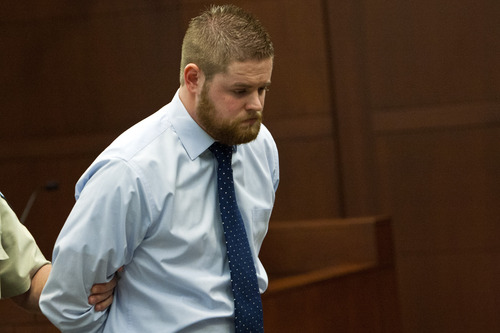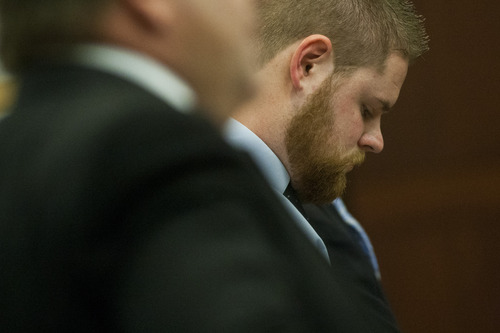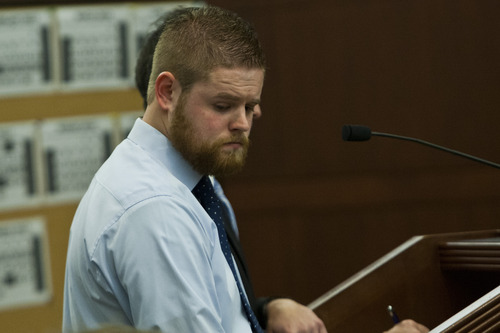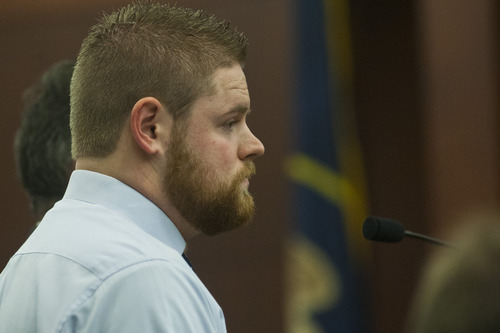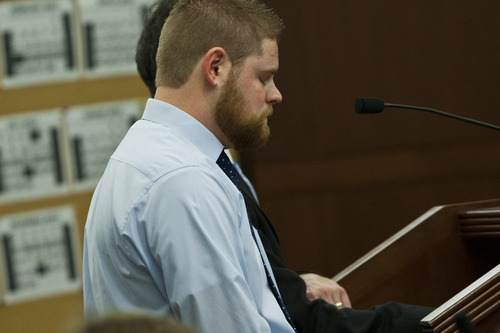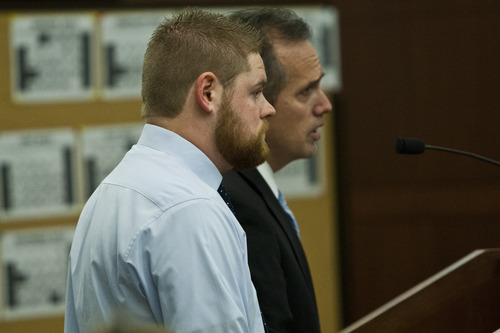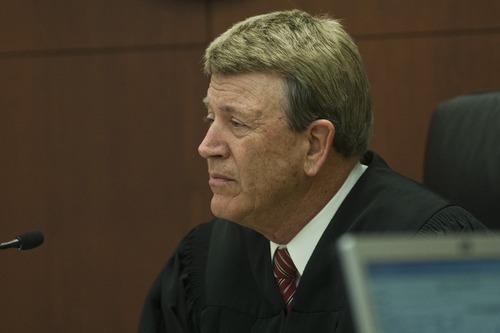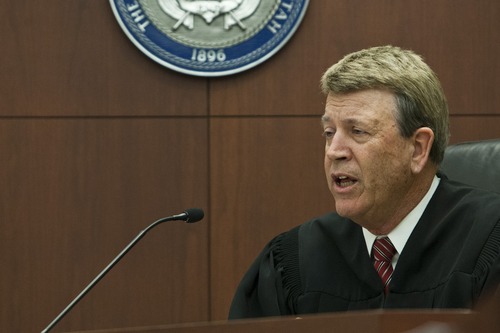Chris Detrick | The Salt Lake Tribune
Skyler Shepherd addresses the family of Esther Fujimoto during his sentencing at the 2nd D
Chris Detrick | The Salt Lake Tribune
Skyler Shepherd is escorted out of the room after his sentencing at the 2nd District Court
Chris Detrick | The Salt Lake Tribune
Skyler Shepherd addresses the family of Esther Fujimoto during his sentencing at the 2nd D
Chris Detrick | The Salt Lake Tribune
Skyler Shepherd addresses the family of Esther Fujimoto during his sentencing at the 2nd D
Chris Detrick | The Salt Lake Tribune
Skyler Shepherd listens during his sentencing at the 2nd District Courthouse in Ogden Wedn
Chris Detrick | The Salt Lake Tribune
Skyler Shepherd listens during his sentencing at the 2nd District Courthouse in Ogden Wedn
Chris Detrick | The Salt Lake Tribune
Skyler Shepherd listens during his sentencing at the 2nd District Courthouse in Ogden Wedn
Chris Detrick | The Salt Lake Tribune
Skyler Shepherd listens during his sentencing at the 2nd District Courthouse in Ogden Wedn
Chris Detrick | The Salt Lake Tribune
Skyler Shepherd listens as his lawyer Glen Neeley speaks during his sentencing at the 2nd
Chris Detrick | The Salt Lake Tribune
Esther Fujimoto's brother, Bryan Fujimoto, speaks to members of the media after Skyler She
Chris Detrick | The Salt Lake Tribune
Second District Judge Ernie Jones listens during Skyler Shepherd's sentencing at the 2nd D
Chris Detrick | The Salt Lake Tribune
Second District Judge Ernie Jones speaks during Skyler Shepherd's sentencing at the 2nd Di
Chris Detrick | The Salt Lake Tribune
Esther Fujimoto's brother, Bryan Fujimoto, speaks to members of the media after Skyler She
Chris Detrick | The Salt Lake Tribune
Skyler Shepherd addresses the family of Esther Fujimoto during his sentencing at the 2nd District Courthouse in Ogden Wednesday January 23, 2013. Second District Judge Ernie Jones called Shepherd's actions on the day Fujimoto died "callous" and "spineless" before sentencing him. Shepherd was found guilty by a six-member jury in December on charges of reckless endangerment, obstruction of justice and failure to render aid. He was sentenced Wednesday to the maximum possible punishment: 2.5 years in jail.
Chris Detrick | The Salt Lake Tribune
Skyler Shepherd is escorted out of the room after his sentencing at the 2nd District Courthouse in Ogden Wednesday January 23, 2013. Second District Judge Ernie Jones called Shepherd's actions "callous" and "spineless" before sentencing him. Shepherd was found guilty by a six-member jury in December on charges of reckless endangerment, obstruction of justice and failure to render aid. He was sentenced Wednesday to the maximum possible punishment: 2.5 years in jail.
Chris Detrick | The Salt Lake Tribune
Skyler Shepherd addresses the family of Esther Fujimoto during his sentencing at the 2nd District Courthouse in Ogden Wednesday January 23, 2013. Second District Judge Ernie Jones called Shepherd's actions on the day Fujimoto died "callous" and "spineless" before sentencing him. Shepherd was found guilty by a six-member jury in December on charges of reckless endangerment, obstruction of justice and failure to render aid. He was sentenced Wednesday to the maximum possible punishment: 2.5 years in jail.
Chris Detrick | The Salt Lake Tribune
Skyler Shepherd addresses the family of Esther Fujimoto during his sentencing at the 2nd District Courthouse in Ogden Wednesday January 23, 2013. Second District Judge Ernie Jones called Shepherd's actions on the day Fujimoto died "callous" and "spineless" before sentencing him. Shepherd was found guilty by a six-member jury in December on charges of reckless endangerment, obstruction of justice and failure to render aid. He was sentenced Wednesday to the maximum possible punishment: 2.5 years in jail.
Chris Detrick | The Salt Lake Tribune
Skyler Shepherd listens during his sentencing at the 2nd District Courthouse in Ogden Wednesday January 23, 2013. Second District Judge Ernie Jones called Shepherd's actions "callous" and "spineless" before sentencing him. Shepherd was found guilty by a six-member jury in December on charges of reckless endangerment, obstruction of justice and failure to render aid. He was sentenced Wednesday to the maximum possible punishment: 2.5 years in jail.
Chris Detrick | The Salt Lake Tribune
Skyler Shepherd listens during his sentencing at the 2nd District Courthouse in Ogden Wednesday January 23, 2013. Second District Judge Ernie Jones called Shepherd's actions "callous" and "spineless" before sentencing him. Shepherd was found guilty by a six-member jury in December on charges of reckless endangerment, obstruction of justice and failure to render aid. He was sentenced Wednesday to the maximum possible punishment: 2.5 years in jail.
Chris Detrick | The Salt Lake Tribune
Skyler Shepherd listens during his sentencing at the 2nd District Courthouse in Ogden Wednesday January 23, 2013. Second District Judge Ernie Jones called Shepherd's actions "callous" and "spineless" before sentencing him. Shepherd was found guilty by a six-member jury in December on charges of reckless endangerment, obstruction of justice and failure to render aid. He was sentenced Wednesday to the maximum possible punishment: 2.5 years in jail.
Chris Detrick | The Salt Lake Tribune
Skyler Shepherd listens during his sentencing at the 2nd District Courthouse in Ogden Wednesday January 23, 2013. Second District Judge Ernie Jones called Shepherd's actions "callous" and "spineless" before sentencing him. Shepherd was found guilty by a six-member jury in December on charges of reckless endangerment, obstruction of justice and failure to render aid. He was sentenced Wednesday to the maximum possible punishment: 2.5 years in jail.
Chris Detrick | The Salt Lake Tribune
Skyler Shepherd listens as his lawyer Glen Neeley speaks during his sentencing at the 2nd District Courthouse in Ogden Wednesday January 23, 2013. Second District Judge Ernie Jones called Shepherd's actions "callous" and "spineless" before sentencing him. Shepherd was found guilty by a six-member jury in December on charges of reckless endangerment, obstruction of justice and failure to render aid. He was sentenced Wednesday to the maximum possible punishment: 2.5 years in jail.
Chris Detrick | The Salt Lake Tribune
Esther Fujimoto's brother, Bryan Fujimoto, speaks to members of the media after Skyler Shepherd's sentencing at the 2nd District Courthouse in Ogden Wednesday January 23, 2013. Second District Judge Ernie Jones called Shepherd's actions "callous" and "spineless" before sentencing him. Shepherd was found guilty by a six-member jury in December on charges of reckless endangerment, obstruction of justice and failure to render aid. He was sentenced Wednesday to the maximum possible punishment: 2.5 years in jail.
Chris Detrick | The Salt Lake Tribune
Second District Judge Ernie Jones listens during Skyler Shepherd's sentencing at the 2nd District Courthouse in Ogden Wednesday January 23, 2013. Jones called Shepherd's actions "callous" and "spineless" before sentencing him. Shepherd was found guilty by a six-member jury in December on charges of reckless endangerment, obstruction of justice and failure to render aid. He was sentenced Wednesday to the maximum possible punishment: 2.5 years in jail.
Chris Detrick | The Salt Lake Tribune
Second District Judge Ernie Jones speaks during Skyler Shepherd's sentencing at the 2nd District Courthouse in Ogden Wednesday January 23, 2013. Jones called Shepherd's actions "callous" and "spineless" before sentencing him. Shepherd was found guilty by a six-member jury in December on charges of reckless endangerment, obstruction of justice and failure to render aid. He was sentenced Wednesday to the maximum possible punishment: 2.5 years in jail.
Chris Detrick | The Salt Lake Tribune
Esther Fujimoto's brother, Bryan Fujimoto, speaks to members of the media after Skyler Shepherd's sentencing at the 2nd District Courthouse in Ogden Wednesday January 23, 2013. Second District Judge Ernie Jones called Shepherd's actions "callous" and "spineless" before sentencing him. Shepherd was found guilty by a six-member jury in December on charges of reckless endangerment, obstruction of justice and failure to render aid. He was sentenced Wednesday to the maximum possible punishment: 2.5 years in jail.



